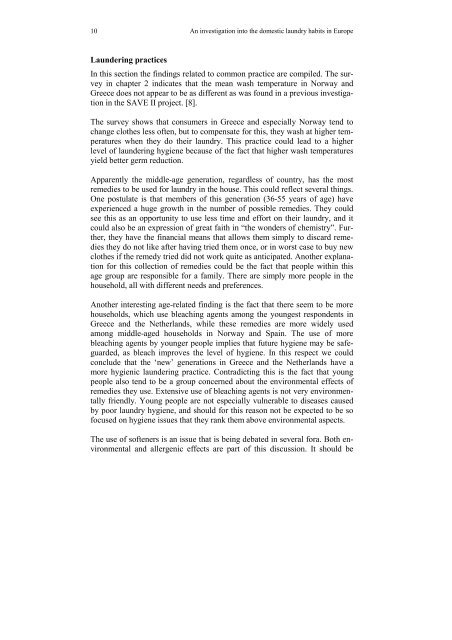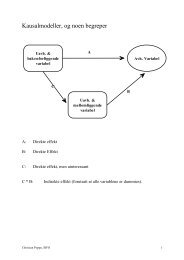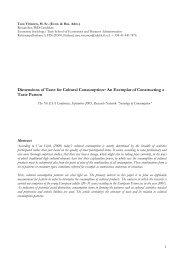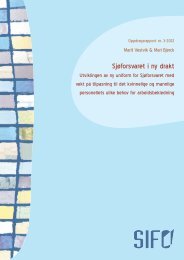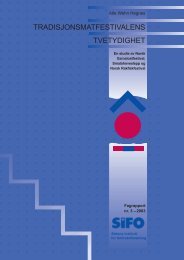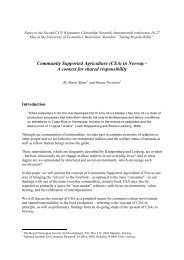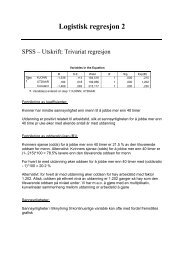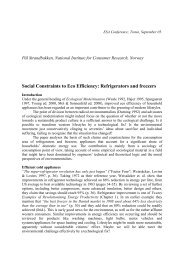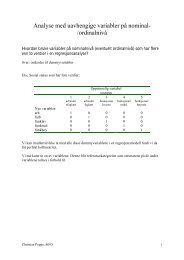an investigation of domestic laundry in europe - habits ... - SIFO
an investigation of domestic laundry in europe - habits ... - SIFO
an investigation of domestic laundry in europe - habits ... - SIFO
You also want an ePaper? Increase the reach of your titles
YUMPU automatically turns print PDFs into web optimized ePapers that Google loves.
10An <strong><strong>in</strong>vestigation</strong> <strong>in</strong>to the <strong>domestic</strong> <strong>laundry</strong> <strong>habits</strong> <strong>in</strong> EuropeLaunder<strong>in</strong>g practicesIn this section the f<strong>in</strong>d<strong>in</strong>gs related to common practice are compiled. The survey<strong>in</strong> chapter 2 <strong>in</strong>dicates that the me<strong>an</strong> wash temperature <strong>in</strong> Norway <strong>an</strong>dGreece does not appear to be as different as was found <strong>in</strong> a previous <strong><strong>in</strong>vestigation</strong><strong>in</strong> the SAVE II project. [8].The survey shows that consumers <strong>in</strong> Greece <strong>an</strong>d especially Norway tend toch<strong>an</strong>ge clothes less <strong>of</strong>ten, but to compensate for this, they wash at higher temperatureswhen they do their <strong>laundry</strong>. This practice could lead to a higherlevel <strong>of</strong> launder<strong>in</strong>g hygiene because <strong>of</strong> the fact that higher wash temperaturesyield better germ reduction.Apparently the middle-age generation, regardless <strong>of</strong> country, has the mostremedies to be used for <strong>laundry</strong> <strong>in</strong> the house. This could reflect several th<strong>in</strong>gs.One postulate is that members <strong>of</strong> this generation (36-55 years <strong>of</strong> age) haveexperienced a huge growth <strong>in</strong> the number <strong>of</strong> possible remedies. They couldsee this as <strong>an</strong> opportunity to use less time <strong>an</strong>d effort on their <strong>laundry</strong>, <strong>an</strong>d itcould also be <strong>an</strong> expression <strong>of</strong> great faith <strong>in</strong> “the wonders <strong>of</strong> chemistry”. Further,they have the f<strong>in</strong><strong>an</strong>cial me<strong>an</strong>s that allows them simply to discard remediesthey do not like after hav<strong>in</strong>g tried them once, or <strong>in</strong> worst case to buy newclothes if the remedy tried did not work quite as <strong>an</strong>ticipated. Another expl<strong>an</strong>ationfor this collection <strong>of</strong> remedies could be the fact that people with<strong>in</strong> thisage group are responsible for a family. There are simply more people <strong>in</strong> thehousehold, all with different needs <strong>an</strong>d preferences.Another <strong>in</strong>terest<strong>in</strong>g age-related f<strong>in</strong>d<strong>in</strong>g is the fact that there seem to be morehouseholds, which use bleach<strong>in</strong>g agents among the youngest respondents <strong>in</strong>Greece <strong>an</strong>d the Netherl<strong>an</strong>ds, while these remedies are more widely usedamong middle-aged households <strong>in</strong> Norway <strong>an</strong>d Spa<strong>in</strong>. The use <strong>of</strong> morebleach<strong>in</strong>g agents by younger people implies that future hygiene may be safeguarded,as bleach improves the level <strong>of</strong> hygiene. In this respect we couldconclude that the ‘new’ generations <strong>in</strong> Greece <strong>an</strong>d the Netherl<strong>an</strong>ds have amore hygienic launder<strong>in</strong>g practice. Contradict<strong>in</strong>g this is the fact that youngpeople also tend to be a group concerned about the environmental effects <strong>of</strong>remedies they use. Extensive use <strong>of</strong> bleach<strong>in</strong>g agents is not very environmentallyfriendly. Young people are not especially vulnerable to diseases causedby poor <strong>laundry</strong> hygiene, <strong>an</strong>d should for this reason not be expected to be s<strong>of</strong>ocused on hygiene issues that they r<strong>an</strong>k them above environmental aspects.The use <strong>of</strong> s<strong>of</strong>teners is <strong>an</strong> issue that is be<strong>in</strong>g debated <strong>in</strong> several fora. Both environmental<strong>an</strong>d allergenic effects are part <strong>of</strong> this discussion. It should be


